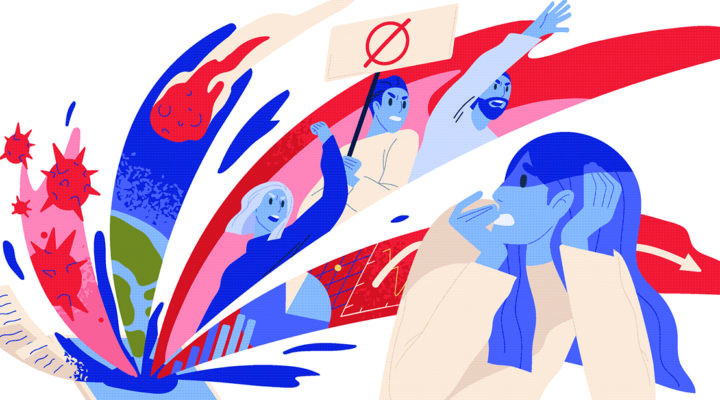I started attending a Southern Baptist church about nine months before I was born. In those preschool years, the message about God was simple and clear: God is love; God is good; God loves the whole world, and God loves me. Now past 60, I still see in that message a profound foundation for faith and living. I will be forever grateful I received it.
Through the years, my faith expanded and evolved. I listened, I learned, I questioned, I doubted, I lived life and grew to find a faith of my own. I accepted a call to full-time ministry and embarked on the education and experience required. On my journey of faith, my understanding moved back and forth on a continuum from conservative to liberal, back to more conservative and then more liberal again. All along the way, I was seeking to live out an authentic faith.
The power of theological fear

J. Claude Huguley
With the benefit of hindsight, I see a pattern that drove my movement on the conservative-to-liberal continuum. I drifted more conservative in my views when messages of fear became more influential. When I focused anew on the simple message of my preschool years, the power of fear was diminished, my trust grew, and my worldview expanded. The words of 1 John 4:18 rang true, “Perfect love casts out fear.”
The fear that was influencing me was theological fear — messages about God or ultimate realities infused with fear. For me, this happened when those early preschool messages were “age adjusted” and fear elements were introduced for motivation: “Yes, God is love and God is good” … but … “God’s love and goodness are focused toward those who love God back and do good like God.”
Behind this subtle shift was a threat — if I didn’t love God and get on God’s team, then God would be disappointed and angry with me. Furthermore, if I didn’t get on board before I died, then God would abandon me and punish me forever. Even though my own church emphasized the “God is love” side of the equation, the underlying threat always was there. I made sure I was on God’s team.
“When I focused anew on the simple message of my preschool years, the power of fear was diminished.”
This threat of God’s disfavor and the fear this engenders filtered down in other ways. The world outside God’s team was presented as a dangerous place, and differences were eyed with suspicion. There was a long list of rules and prohibitions attributed to God; those outside were seen as constant threats to lead God’s people astray.
This mindset encouraged a distrusting of anyone outside the narrow confines of those deemed faithful and skepticism of any ideas or differing perspectives the outsiders might offer. Distrusting outsiders also reinforced an uncritical trust of authoritative insiders who could make any perceived threat into a call to arms, solidifying team loyalty and an “us-versus-them” response. If outsiders offered any resistance or criticism to these views, then this would be seen as a confirmation that they did, indeed, pose a threat. All this created a catch-22 that just entangled “believers” more tightly in the web.
Fear hijacks critical thinking
One other problem is derived from the nature of human fear. When any of us are threatened — physically, spiritually or existentially — fear activates a protective response urging us to fight, to flee or to freeze. While in a state of fear, our total being focuses on addressing the perceived threat, superseding everything else vying for attention. If we can be kept in this state of fear, then critical thinking is hijacked and we look for simple explanations and quick reactions while overlooking more complex understandings. Authoritative leaders in religion, politics and media manufacture “boogeyman” threats to maintain this state of fear, deceiving, distracting and manipulating the fearful.
“If we can be kept in this state of fear, then critical thinking is hijacked.”
This misuse of fear can be powerful, pushing any of us to abandon core tenets of a previously held faith with little awareness of what we are doing. Teachings about love of neighbor, welcome of the stranger, praying for enemies and looking first to the interest of others can be forgotten or overlooked when the urgency of fear is driving us to think only of ourselves or our group.
Unchecked, fear can move us away from experiencing the God who is present with grace — a grace present with love for our neighbor and our enemy, present with forgiveness for saint and sinner, and present with radical acceptance of persons alike and different. Malignant fears continually distort the profound, simple, true and freeing message of my preschool years: “God is love, God is good, God loves the whole world, and God loves me.”
How might we fight fear?
How do we help our brothers and sisters trapped in a web of fear? How do we address the logs in our own eyes that may be hindering our efforts to assist? My experience as a hospital chaplain might offer a way forward.
In my work, I sometimes see walls of denial when people are confronted with a life-limiting illness in themselves or a loved one. Initially, they may resist objective facts and deceive themselves while searching for alternatives that would make their feared diagnosis untrue. These individuals are not truly liars, and these are not bad or faithless people. They are scared. Their reality is so scary that they must create elaborate delusions in order to cope.
“In my work, I sometimes see walls of denial when people are confronted with a life-limiting illness in themselves or a loved one.”
A direct challenge to their self-deceptions is seldom helpful. They need someone who is for them, not against them. They need someone who will come alongside them, supporting them, listening to their fears and grief, and assisting them in discovering a faith sufficient for getting through the crisis.
As this inner strength (grace) grows in them, their fear is disarmed, and they no longer need the protection of their denial for avoiding the truth. In this grace they find the courage, security and sense of meaning needed for living into their unwanted reality.
What is needed is grace
Denials of systemic racism, economic inequality and misogyny, and the demonizing of those who highlight injustices, might seem different from denial of a health issue. But all share a common fear — fearing that a particular concern might indeed be real and seeing no pathway for coping with that unwanted reality. What is needed is grace — a larger, all-encompassing grace — capable of transforming the very real abuses and threats from the past into a lived-out vision for a different present and future.
It is a grace that has stood by the wounded through the centuries, recognizing the full and unspeakable inhumanity, objectification and horror these were experiencing while continually providing the strength for enduring and persisting through it all.
It is a grace that knows the shameful and guilt-ridden acts of the victimizers and their descendants but looks deeper, seeing the intergenerational fear, shame and guilt fueling those acts and continuing to reproduce itself in new generations.
“Grace can change us, nurturing self-compassion in us and evoking empathy for the fearful around us.”
It is a grace that embraces victims and victimizers, exploited and privileged, individuals and systems, and sees hope, new possibilities and new beginnings.
This grace brings acceptance where it finds shame, forgiveness where it finds guilt, and disarms the core threats to the spirit driving the many forms of destructive fear.
This is the grace the father gives in the parable of the prodigal son and the grace Jesus gives to Simon Peter by the seashore after the Resurrection. It is a grace that does not define us by failures and mistakes of the past but recognizes our highest potential, continually inviting us and those around us into a healing community where grace abounds.
This grace transforms the graced and those they grace in the world — making possible the seemingly impossible.
How do we let this grace disarm the fear infecting our politics?
We can begin by expanding our belief and trust in it ourselves. We keep embracing grace while naming and owning our own sources of shame, guilt and fear. This may require the constant prayerful refrain of Mark 9:24 — “I believe, help me in my unbelief.”
Even still, grace can change us, nurturing self-compassion in us and evoking empathy for the fearful around us. This newfound empathy not only confirms grace’s transforming work within us but also gives space (and grace) to those caught in fear, allowing them to start taking their own steps toward releasing denial and fear. Grace brings healing to the wider world one grace-awakened person at a time, reaffirming God is love, God is good, God loves the whole world, and God loves me. May it be so.
J. Claude Huguley is a son, brother, husband, father and grandfather who has served as a hospital chaplain for more than 30 years in Nashville, Tenn. He is the author of Transforming Fear with Love: Trusting the Gift of Grace. He and his family are members of Immanuel Baptist Church in Nashville.
Related articles:
I’m fearing the fear of fear itself | Opinion by Brett Younger
We’ve got plenty to be afraid of these days. So why does the Bible tell us not to fear? | Opinion by Corey Fields
SBC seminary presidents are propagating fear to maintain control | Opinion by Laura Levens


